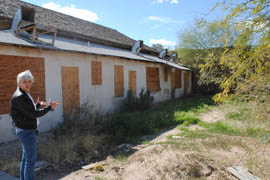[Source: Jessica Testa, Cronkite News, 2/16/2012] – FLORENCE – To most people, these old buildings look like they’re decaying from the inside out. To Bonnie Bariola, they’re treasures, held up by century–old adobe brick and generations of hand-me-down stories. The Ceyla Long Sweeny Residence, built in 1876, is a small adobe house with manure for insulation and saguaro ribs for a roof. Bariola points to broken window, shattered by a tossed rock. A few blocks over, three dead pigeons lie just inside the entrance to the Cuen House and Butcher Shop, the first telephone exchange in Pinal County. Bariola fearlessly marches through as pigeons coo from the rafters.
Plans to restore the buildings won grants of more than $90,000 each through the Heritage Fund, which Arizona voters established in 1990. And both were stripped of that promised funding in 2009, when the state swept the Heritage Fund in an effort to balance its sinking budget.
In 2010, lawmakers eliminated the Heritage Fund, pulling the plug on dozens of approved, construction–ready projects, including five in Florence.
 Bonnie Bariola, member of the Florence Preservation Foundation, wrote a grant for the restoration of the town’s historic White House.
Bonnie Bariola, member of the Florence Preservation Foundation, wrote a grant for the restoration of the town’s historic White House.
“Using Heritage funds, we’ve been able to maintain a part of history,” said Bariola, grant writer for the Florence Preservation Foundation. “Without funding, the culture of these buildings wastes away.” During the Heritage Fund’s 20–year run, Florence received more than $1.5 million in 18 state grants to restore its 19th century structures. The former mining community and Pinal County seat was third in the state for total dollars granted, behind Phoenix and Tucson.
Now, a state lawmaker is moving forward with a resolution that would put the Heritage Fund back on the ballot in November. If approved, the fund would be protected from any future sweeps thanks to the 1998 Voter Protection Act, a constitutional amendment that prohibits state lawmakers from reallocating any voter–created funds. “It’s fitting we do this, especially in our centennial year,” Rep. Russ Jones, R–Yuma, said recently to the House Committee on Agriculture and Water, which unanimously voted to support HCR 2047.
The Heritage Fund provided up to $10 million annually from the Arizona Lottery to both the Arizona Game and Fish Department and Arizona State Parks. Game and Fish used the money to promote outdoor recreation, help threatened and endangered species and educate residents about the environment and wildlife. Arizona State Parks used the fund for its own acquisitions and improvements and administered grants through programs benefiting historic preservation, trails and parks.
It’s not just Florence benefiting from the Heritage Fund – every city and town in Arizona has received the grant money, said Janice Miano, part–time executive director of the Arizona Heritage Alliance. “The impact is most noticeable in the rural counties, where any infusion of external funds for trail maintenance, land acquisition and construction repair will have a far larger impact to the relative population,” she said.
A Heritage Fund grant for $60,000 was canceled for a book on midcentury modern architecture published by the Phoenix Historic Preservation Commission. The city was able to shore up the money from federal grants to complete the project, and “Midcentury Marvels” will soon have its second printing.
Oro Valley wasn’t as fortunate. A $27,660 grant to build a dog park was canceled, along with a $111,160 grant to restore the 1874 Steam Pump Ranch. Ainsley Legner, director or Oro Valley’s Parks, Recreation, Library and Cultural Resources Department, said she’d be delighted to see Oro Valley residents be able to visit and use that land for recreation. “We don’t have any money available to improve the site. We can’t stabilize all the structures and provide the necessary amenities, like a restroom or a fire hydrant,” she said. “When you take away something as significant as Heritage funding, you can no longer pull all those resources together to make good things happen.”
Jay Ziemann, legislative liaison for Arizona State Parks, said the agency’s board supports Jones’ resolution but that his optimism is limited. Ziemann said many legislators share the views of Rep. Brenda Barton, R–Safford, who raised concerns in the committee meeting about the availability of lottery funds. A reinstated Heritage Fund would reduce the amount of revenue available to the Legislature. “It’s nice that it cleared that first step, but it’s got a long way to go,” Ziemann said. “I know it has a lot of hurdles ahead.”